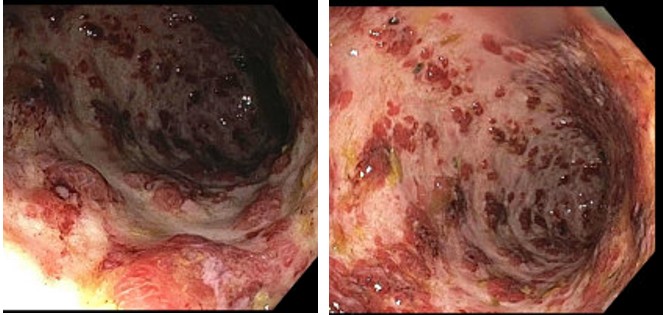Tuesday Poster Session
Category: Colon
P4736 - Successful Switch to Subcutaneous Infliximab (Zymfentra) After Development of High Titer Antibodies in a Patient With Ulcerative Colitis
Tuesday, October 28, 2025
10:30 AM - 4:00 PM PDT
Location: Exhibit Hall
- YE
Yousra Eltagouri, MD (she/her/hers)
Lahey Clinic
Burlington, MA
Presenting Author(s)
Yousra Eltagouri, MD, Karim T.. Osman, MD
Lahey Clinic, Burlington, MA
Introduction: Infliximab (IFX) is a cornerstone biologic for ulcerative colitis (UC) and Crohn’s disease.
Monitoring IFX levels and antibodies to IFX (ATI) is routine. ATI are associated with lower drug
levels and loss of response. Six IFX biosimilars exist—only one, IFX-dyyb (Zymfentra®), is
subcutaneous. Switching between biosimilars does not appear to worsen immunogenicity
(PMID: 37788264). We present a case of IFX loss of response managed successfully with
Zymfentra®.
Case Description/
Methods: A 39-year-old undocumented male presented with 6 months of bloody diarrhea and
abdominal pain. He was anemic (Hgb 7.6 g/dL), with leukocytosis (WBC 14.5 K/μL) and fecal
calprotectin >4800 mcg/g. CT abdomen showed pancolitis. Flexible sigmoidoscopy revealed
Mayo 3 colitis (Figure); biopsies confirmed chronic active colitis. He was diagnosed with UC and
started on prednisone and IFX 5 mg/kg. At 8 weeks, proactive therapeutic drug monitoring
(TDM) showed IFX level 10.2 mcg/mL & no ATI. At 6 months, he was in clinical, biochemical,
and endoscopic remission, but proactive TDM showed low IFX level (3.5 mcg/mL) & ATI >100
AU.
He was dose-escalated to 10 mg/kg every 4 weeks and started on azathioprine 50
mg/day. Due to cost barriers, he was unable to continue infusions but qualified for
subcutaneous injections via support programs. The only available timely option was
Zymfentra®, which was initiated at 240 mg every other week, two months after ATI detection.
After 4 doses, trough IFX level was 22.2 mcg/mL despite persistent ATI >100 AU. He remains in
clinical remission.
Discussion: This case highlights several key points. First, proactive TDM may not always correlate
with clinical status, as this patient remained in remission despite high ATI. Second, the drop in
IFX level from week 8 to month 6 supports ATI as potentially neutralizing. Third, switching to
Zymfentra® restored therapeutic levels despite persistent ATI, suggesting these antibodies may
not fully neutralize the subcutaneous formulation. Although azathioprine may have influenced
immunogenicity, ATI levels remained high despite improved IFX levels.
To our knowledge, this is the first case describing successful transition from intravenous
IFX to Zymfentra® in the setting of high-titer ATI, with restoration of therapeutic levels and
sustained remission. Subcutaneous IFX may help mitigate immunogenicity in select patients,
though further studies are warranted.

Figure: Mayo 3 colitis
Disclosures:
Yousra Eltagouri indicated no relevant financial relationships.
Karim Osman indicated no relevant financial relationships.
Yousra Eltagouri, MD, Karim T.. Osman, MD. P4736 - Successful Switch to Subcutaneous Infliximab (Zymfentra) After Development of High Titer Antibodies in a Patient With Ulcerative Colitis, ACG 2025 Annual Scientific Meeting Abstracts. Phoenix, AZ: American College of Gastroenterology.
Lahey Clinic, Burlington, MA
Introduction: Infliximab (IFX) is a cornerstone biologic for ulcerative colitis (UC) and Crohn’s disease.
Monitoring IFX levels and antibodies to IFX (ATI) is routine. ATI are associated with lower drug
levels and loss of response. Six IFX biosimilars exist—only one, IFX-dyyb (Zymfentra®), is
subcutaneous. Switching between biosimilars does not appear to worsen immunogenicity
(PMID: 37788264). We present a case of IFX loss of response managed successfully with
Zymfentra®.
Case Description/
Methods: A 39-year-old undocumented male presented with 6 months of bloody diarrhea and
abdominal pain. He was anemic (Hgb 7.6 g/dL), with leukocytosis (WBC 14.5 K/μL) and fecal
calprotectin >4800 mcg/g. CT abdomen showed pancolitis. Flexible sigmoidoscopy revealed
Mayo 3 colitis (Figure); biopsies confirmed chronic active colitis. He was diagnosed with UC and
started on prednisone and IFX 5 mg/kg. At 8 weeks, proactive therapeutic drug monitoring
(TDM) showed IFX level 10.2 mcg/mL & no ATI. At 6 months, he was in clinical, biochemical,
and endoscopic remission, but proactive TDM showed low IFX level (3.5 mcg/mL) & ATI >100
AU.
He was dose-escalated to 10 mg/kg every 4 weeks and started on azathioprine 50
mg/day. Due to cost barriers, he was unable to continue infusions but qualified for
subcutaneous injections via support programs. The only available timely option was
Zymfentra®, which was initiated at 240 mg every other week, two months after ATI detection.
After 4 doses, trough IFX level was 22.2 mcg/mL despite persistent ATI >100 AU. He remains in
clinical remission.
Discussion: This case highlights several key points. First, proactive TDM may not always correlate
with clinical status, as this patient remained in remission despite high ATI. Second, the drop in
IFX level from week 8 to month 6 supports ATI as potentially neutralizing. Third, switching to
Zymfentra® restored therapeutic levels despite persistent ATI, suggesting these antibodies may
not fully neutralize the subcutaneous formulation. Although azathioprine may have influenced
immunogenicity, ATI levels remained high despite improved IFX levels.
To our knowledge, this is the first case describing successful transition from intravenous
IFX to Zymfentra® in the setting of high-titer ATI, with restoration of therapeutic levels and
sustained remission. Subcutaneous IFX may help mitigate immunogenicity in select patients,
though further studies are warranted.

Figure: Mayo 3 colitis
Disclosures:
Yousra Eltagouri indicated no relevant financial relationships.
Karim Osman indicated no relevant financial relationships.
Yousra Eltagouri, MD, Karim T.. Osman, MD. P4736 - Successful Switch to Subcutaneous Infliximab (Zymfentra) After Development of High Titer Antibodies in a Patient With Ulcerative Colitis, ACG 2025 Annual Scientific Meeting Abstracts. Phoenix, AZ: American College of Gastroenterology.
